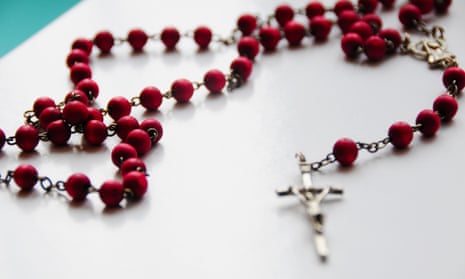My patient was sweaty and unsettled. He denied pain but reported thirst, taking a grateful sip of water from the glass I held up to him. We had spoken earlier in the week about his limited lifespan after the failure of multiple lines of chemotherapy.
During that conversation, he had searched repeatedly for hope of a specific type – that there was some other chemotherapy I could administer. I had gently, but repeatedly, denied him that specific hope, telling him that I would do everything in my power to help him feel better but there was no chemotherapy left. Dreadful as the exchange felt at the time, I reminded myself that my patient had always valued honesty.
He expressed happiness that his children were married and regret that he would never know their children. He talked about the struggle his life had become lately and his hope for a peaceful ending. And then in the same breath he asked, “Doctor, do you believe in God?”
The question brought me up short. Whose God, I could ask, yours or mine or a universal benevolent entity? Was there a benefactor God and another God responsible for visiting suffering on the world? Was his question merely curious or did it go to the heart of who I was as a person, and as his doctor? Did my patient want me to pray for him so he may go to heaven or did he want to pray for me, so that I may be a better oncologist?
I thought about the literature that suggested many patients find comfort in religion and the conflicting reports that the devoutly religious had a harder time letting go because they were clinging to the notion of a miracle performed by a higher being. I thought of telling him politely that religion was immaterial in a secular public hospital. I could lightly joke that we had a hard enough time teaching doctors how to manage sepsis let alone how to navigate a conversation about the existence of God.
I recalled the gossip about a doctor who had been quietly fired because of perceived religiosity at the bedside of vulnerable patients. Rumours abounded that called to examine the patient, the doctor had instead dropped to the knees to pray.
Somewhat tellingly, I never found an actual witness to the event but it didn’t matter because the mere notion that a doctor had danced with religion was enough to set tongues wagging. The last way in which you wanted to erode respect was to be known as some kind of fringe doctor who talked religion instead of fluid balance or neuropathology.
“So Doctor, do you believe in God?” my patient repeated.
I studied his expression and detected no challenge, only the telltale signs of serious illness. The beads of sweat across his ashen forehead foretold approaching death. On his bedside table rested a Bible, a rosary and holy water. On his wall were pasted a host of religious consolations. Clutching the beads to his chest he made an observation that seemed more like a plea: “I have to believe that I am going to a better place.”
In that moment all the circumspect answers I had been pondering suddenly melted away. Reaching for his hand, I replied: “Yes, I believe in God.” I said it unwaveringly and watched his whole body relax. He sunk back into his pillow, exhaled and briefly smiled, oblivious to my incredulity that finally, this affirmation is all he needed as reassurance.
“Thank you, doctor.” Those were his final words to me – he died later that night, peacefully.
Later that week, a patient revolted against her God. “Religion sucks,” she declared, dismayed that a lifetime of devout observation had still brought her to death’s door. “Don’t you think so?” she asked, tears streaming down her face.
“I can see your disappointment,” I sympathised, not hesitating to walk in her shoes.
“Thankfully you’re not one of those preachy types,” she smiled weakly.
These two conversations reminded me about an account of a child under the care of an eminent paediatrician. Just before treatment began, the grandmother stood up and said: “I think I understand everything, Doctor, but what I need to know now is whether you are a Christian.” Unfazed, the Jewish doctor replied, “Madam, I am as Christian as you need me to be.” I have regarded this exchange as a useful model for a doctor who wants to respect patients’ religion without triggering a hot debate; most cancer patients don’t search out an oncologist to have a theological discourse.
Among the many things we don’t teach our doctors is how to navigate conversations about religion and spirituality with patients. In fact, we teach them quite the opposite – never to utter science and religion in the same breath.
This makes sense when it comes to prescribing habits being influenced by religious beliefs. In making a choice about contraception and abortion, receiving the rubella or the HPV vaccine, accepting a blood transfusion, donating an organ or having a defibrillator inserted, our patients deserve nothing but an informed, impartial and scientific view. Proselytising is unacceptable and prayer is not an alternative to timely surgery or aggressive resuscitation. The religious bent of a doctor poses a real hazard for patients who lack alternatives, say in a rural region.
Our patients routinely volunteer information about their sexual habits, drug abuse and domestic violence and we rarely feel uncomfortable in the same way as we do at the mention of religion. Like me, many doctors wonder whether and how to handle a conversation about a perennially controversial topic without compromising ourselves in the process.
The rush of modern medicine combined with the fragmentation of healthcare means that no one doctor is (or feels) wholly responsible for one patient but the need to sit with our patients, tap into their fears and assuage their concerns is only growing. Even if their invitations open with a reference to God, considerate listening and golden silence have little to do with religion and much to do with humanity.
By balking at the mere mention of God, I can’t help thinking that we may be missing an opportunity to provide comfort to our patients and make them feel heard and seen in ways that we don’t fully appreciate. The art of medicine lies in helping patients benefit from its science while remembering that illness is just one of many threads in the fabric of their lives.
With one in five Australians not identifying with any religion, clearly not every sick individual seeks meaning in God but as an oncologist I see that notions like hope, legacy and a life well-lived take on an urgency when serious illness strikes. Our patients are grateful then that no matter what our religious beliefs, we are willing to share in a decidedly universal cause, that of our shared humanity.

